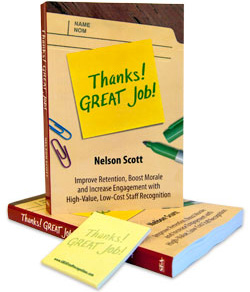Miscellaneous articles on staff recognition
Ask employees how they want to be recogized
Part one of a 3-part interview with the “Guru of Thank You” Bob Nelson
While he was in Nashville for the National Association for Employee Recognition conference in May, Nelson Scott had an opportunity to sit down with Bob Nelson, the author of several books that have sold more than three million copies. These include 1001 Ways to Reward Employees, 1001 Ways to Energize Employees and Managing for Dummies. His most recent book, The 1001 Rewards and Recognition Fieldbook truly lives up to its subtitle, “The Complete Guide.” Much of this comprehensive book is based on Bob’s doctoral research on non-monetary recognition.
In this first of a three-part interview, Bob talks about how to begin to recognize staff and value of cash as a motivator.
NS: If you were a manager who wanted to start recognizing staff, where would you begin? What would you do first?
Bob Nelson: The first thing is that I would ask them what things they find motivating. If you have a staff meeting, I would put the topic of recognition on the agenda. I would tell them I had read an article or book that was talking about this and it got me thinking – are we doing enough recognition around here? The more I thought about it, the more I realized I can’t answer that question; I’ve got to ask you, do you think we are good enough? If you are honest with that, it is unlikely that you will have anyone in the group telling you “I’ve had it up to here with you telling me how good I am.” You will find out about missed opportunities and the fact that we said were going to celebrate when we finished this project, but it slipped away and then we got another project after that. For most employees, the only reward for doing a good job is getting two more to work on. It can quite sobering that we end up doing everything, but what we should be doing: finding time to celebrate and thank people for the good job they are doing. You could follow up with another question: who would like to help get something going? Mary, you have said for a couple of years we should be do something more. Who would like to help Mary? As you involve them, not only will you be more on the mark, but it will be their program, not yours or HR’s.
NS: Some managers believe that the way to acknowledge and motivate people is to give everyone another item bearing the company logo. How would you convince these managers that employees no longer see t-shirts, jackets or travel mugs as meaningful recognition?
Bob Nelson: Survey them. We are looking forward to next year for recognition, and want to see what things people would be interested in. Then list everything you have done this year, and last year, and maybe some other ideas, and leave some blanks. Ask them what they would be excited about. Have an open-ended question too. You will have people write in, “No more coffee mugs!” That becomes evidence that you can show managers. You can say if our purpose is to be motivating, this actually makes them feel unmotivated from our evidence.
If the related question is, why do managers do that? It becomes a simple, convenient way to do things. We think of motivation more times than not as a thing and not an activity because, historically, we have done that. Our focus becomes on let’s have more things, or new things. Increasingly, that is not the aspect that is important. It is the intangible, the personal aspect that makes things happen.
NS: How effective is cash as means of recognizing and motivating staff?
Bob Nelson: Lots of studies say it’s not. Other things are better, even if it is merchandise. There have been studies that compare cash and merchandise. You have a higher perceived value in merchandise. You get more bang for the buck. Better yet are things that don’t cost if you can find a focus to do it. The intangibles.
I am not saying money is not important. We need money. It is just that other things are more important to people. I have done hundreds and hundreds of sessions where I have an activity and ask people to think about the last time when they were appreciated. No one ever thinks of the number on his or her paycheque. They think of someone who took the time and effort to say or do something after they had a success. This is almost universal. It is the expectation of being noticed and appreciated for what we did.
Peter Drucker says that at first money has motivating value, but with repeated use it becomes an expectation, an entitlement. For this reason he indicates that money is losing its power as a motivator of performance. It has becomes increasingly expected by employees. This means you just get people expecting more. It is a Catch-22. You give people more and you get less behaviour that you need.
If you go back to what people most value and try to do that well, it tends to have a greater impact and a longer-term impact.
[Go to: Part 2: Bob Nelson discusses how to motivate managers to recognize staff and the importance of informal recognition]
[Return to miscellaneous articles index]
[Return to Articles Index]
[Back to top]
|




